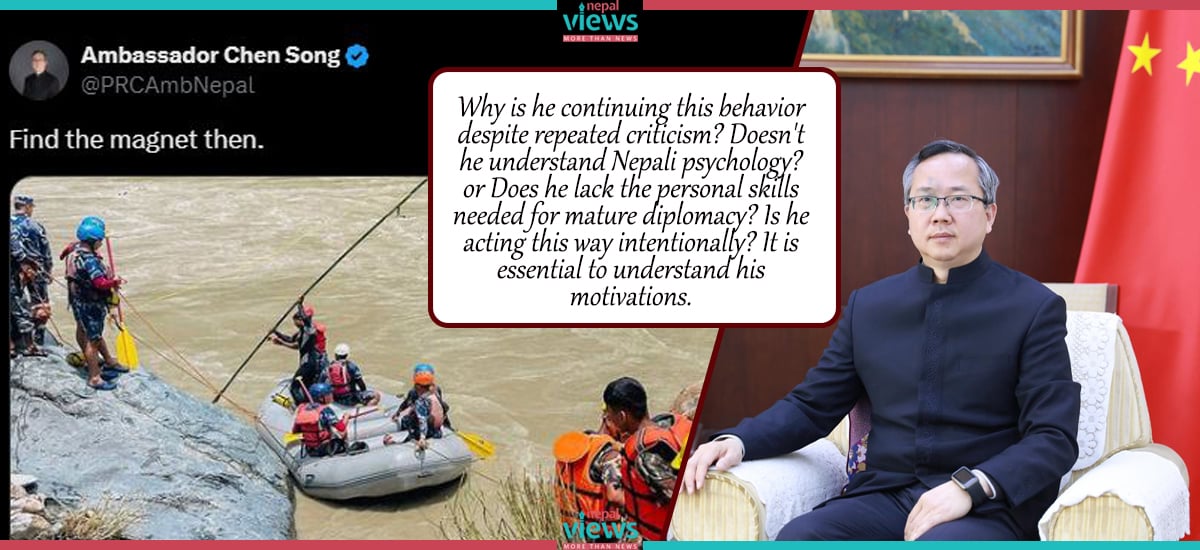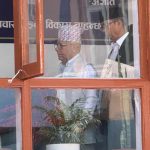Kathmandu: Chinese Ambassador Chen Song has faced criticism for making a “joke” about the Simaltal bus accident. The exact intention behind his comment remains unclear. It could result from linguistic misunderstandings, a lack of insight into Nepali cultural sensitivities, or another reason. The embassy is yet to provide any clarification.
Condolences can certainly be expressed for the bus accident and the loss of lives. But, from other perspectives, this incident might not be an issue of diplomatic concern. Previously, Ambassador Chen Song was also criticized for making controversial remarks about a tweet by journalist Gajendra Budhathoki. Following the previous incident, Ambassador Chen Song needed to be cautious while posting on social media.
Nevertheless, his recent comments on the social network X also appear objectionable to Nepali people. The issue has now reached the parliament. Nepali Congress MP Ramhari Khatiwada coined the comment of Ambassador Chen Song as objectionable and urged the Ministry of Foreign Affairs to seek clarification from the ambassador.
On July 28, he wrote “Find the magnet then” in English while reposting a news article titled “19 kg magnet, brought to search for the lost bus, is itself missing.”
In simple understanding, the sarcastic implication of the comment can be: “You couldn’t find the missing bus and passengers, so now search for the lost magnet.” He did not understand the meaning of such a comment in Nepali psychology or did he deliberately try to make fun of Nepal’s incompetence?
If the notion had positive sentiments and diplomatic dignity, he could have expressed support by wishing for the success of the search efforts or offering China’s assistance to Nepal if needed. However, his comment reflected the meaning that Nepal was incompetent as it was not only able to find the bus but also lost the magnet.
On the morning of July 12, a bus traveling from Kathmandu to Gaur, and another coming from Birgunj to Kathmandu swept away into the Trishuli River at Simaltal, Chitwan district.
Out of 65 passengers, 62 were missing. The whereabouts of the buses and most of the passengers are still unknown. Upon the request of the Government of Nepal, India sent a 12-member diving team with magnets to assist in the search. It seems that the Chinese ambassador’s comments are aimed not only at Nepal but also at the failure of the Indian search and rescue team.
Nepalis reacted strongly to the ambassador’s comments online. However, he defended himself by stating that his comment was not intended to be objectionable. Responding to the criticism, he said, “Some people find my comments inappropriate. My response is, what’s wrong with my answer-comment? Shouldn’t the search be expedited and facilitated in every way? If a magnet is needed to speed up the search operation, then search for it. When the magnet got lost, people started thinking about ending the search operation.”
Finally, he wrote ‘Good luck to all search team’. After facing objections and harsh reactions from Nepalis, he could have apologized humbly, saying, “I am sorry if my comment has hurt anyone’s feelings.” However, he defended his comments even engaged in heated exchanges with users on X, and responded to some comments immediately.
The Chinese ambassador’s habit of being unnecessarily active on social media, commenting on unrelated topics, and using language that doesn’t align with Nepali cultural norms, appears strange, undignified, and inappropriate.
Why is he continuing this behavior despite repeated criticism? Doesn’t he understand Nepali psychology? or Does he lack the personal skills needed for mature diplomacy? Is he acting this way intentionally? It is essential to understand his motivations.
As per the suggestion of MP Khatiwada in the Parliament on Tuesday, the Ministry of Foreign Affairs should seek clarification from the Chinese ambassador regarding the matter.
Nepali version of the news











